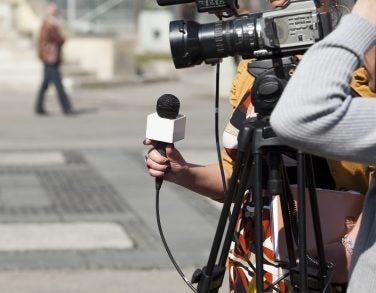
The UK’s largest local television licence operator is closing two studios meaning it will have five remaining for the 20 areas it serves.
Broadcast regulator Ofcom approved the changes after That’s TV chief executive Daniel Cass argued that maintaining separate studios and offices came at a considerable cost that could be better spent on journalism production.
The proposal is a reflection of the way That’s TV has already been operating during the pandemic and takes lessons learned from remote and flexible working, Ofcom said.
That’s TV stations and where they will be based:
- Scotland: Aberdeen, Ayr, Dundee, Edinburgh, Glasgow – based in Glasgow
- North of England: Carlisle, Grimsby, Manchester, Preston, Scarborough – based in Manchester
- East of England: Cambridge, Norwich – based in Norwich
- South of England: Basingstoke, Guildford, Oxford, Reading, Salisbury, Southampton – based in Salisbury
- Wales: Swansea – based in Swansea
In 2019 Ofcom let That’s TV close 13 of its studios after being assured news and interviews would still be recorded within the licensed area of each service.
For the past two years That’s TV has had seven regional production centres producing content for its 20 local stations – with those in Edinburgh and York now due to shut.
Cass told Press Gazette he is now looking at hiring more journalists.
“During the pandemic we have looked again at how we can offer more flexible working options for our staff, including those with childcare and other responsibilities,” he said.
“We will always want to look at how to deliver the best news services for our viewers. Our aim is not just to keep on doing what we’ve always done but to make sure our business is in a strong position to deliver local news and information over the coming decade. This will involve remote working alongside on-the-ground reporting, and use of high-tech studios for presentation.
“Great journalists are the key to our news services. We are now hiring, both additional freelancers and full-time employees. We will continue to equip our journalists with the technology they need, wherever they are working from, and to focus our resources on real news delivery for the benefit of our viewers.”
Cass told Ofcom the five news production offices kept by That’s TV will support journalists’ newsgathering roles by providing regional facilities for editing content, reviewing work and finalising scripts.
He suggested this would result in greater quality control and consistency across the 20 stations.
The newsgathering itself, including conducting interviews, will “frequently” take place on-location in each area with remote video reporting also being utilised “where appropriate”.
He plans to use two central studio hubs in the Manchester and Glasgow offices to record news links for the local content broadcast in each of the 20 areas, in part so journalists have greater flexibility to focus on and deliver local content.
That’s TV initially received funding via the government’s local TV initiative, introduced in 2011 by former culture secretary Jeremy Hunt, which used money from the BBC licence fee. However, like the rest of the UK’s local TV network, it is now self-sustaining.
Ofcom said it took into account the Covid-19 pandemic, both in terms of the financial impact that means greater flexibility is needed where possible, and the changes in technology that meant conducting interviews remotely had no adverse impact on services across the TV industry.
It added that there are “more effective and efficient ways” to cover local content than by being anchored to a physical location, although this is still Ofcom’s preference where it is “practically possible” to have a local base.
The regulator, which felt reassured there should be no difference in the level of local content seen by viewers, said: “We consider that this proposal will allow That’s TV to continue to deliver its commitments to its viewers, specifically with regard to maintaining a local presence in the area of each licensed service.
“This is particularly important to Ofcom; while the request will reduce the overall number of studios/main production bases used by That’s TV, the commitment for journalists and reporters to continue to collect, develop and record interviews both on location within the licensed area of each service and by utilising advances in technology to record interviews via online video conferencing, such as Zoom, means that the local presence for each service included in this request will continue to be maintained.”
That’s TV has committed to update Ofcom every year about how it is maintaining a local presence in each area it covers.
Email pged@pressgazette.co.uk to point out mistakes, provide story tips or send in a letter for publication on our "Letters Page" blog
